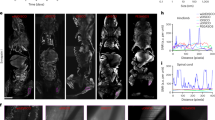Abstract
MICE inoculated with an Ehrlich Lettré ascites tumour have a life-span of 2–3 weeks. In the course of ionic balance studies on such mice we noticed that these animals, after being given lithium, tended to retain more than normal controls. Daily lithium injections (1 ml. of 150 m.equiv./l. lithium chloride subcutaneously) were started on either the fifth or tenth day after inoculation, and were continued for a further four days. Food and water were given ad libitum. On the fifth day the mice were lightly etherized, samples of the ascitic fluid were with-drawn and blood was obtained by cardiac puncture. Plasma, red blood cells, ascites supernatant fluid and tumour cells were analysed for sodium, potassium and lithium using a Beckman flame spectrophotometer. All mice were examined for the presence of macroscopic secondary deposits.
This is a preview of subscription content, access via your institution
Access options
Subscribe to this journal
Receive 51 print issues and online access
$199.00 per year
only $3.90 per issue
Buy this article
- Purchase on Springer Link
- Instant access to full article PDF
Prices may be subject to local taxes which are calculated during checkout
Similar content being viewed by others
References
Maizels, M., and Remington, Mary, and Truscoe, R., J. Physiol., 140, 48 (1958).
Author information
Authors and Affiliations
Rights and permissions
About this article
Cite this article
SIMON, S., TRAUTNER, E. & COATS, D. Lithium Retention in Ascites Tumour Mice. Nature 183, 1128–1129 (1959). https://doi.org/10.1038/1831128a0
Issue Date:
DOI: https://doi.org/10.1038/1831128a0
Comments
By submitting a comment you agree to abide by our Terms and Community Guidelines. If you find something abusive or that does not comply with our terms or guidelines please flag it as inappropriate.



